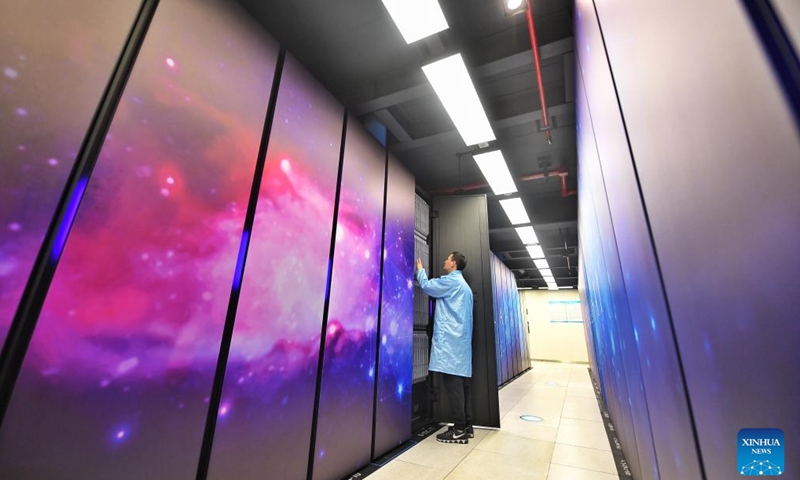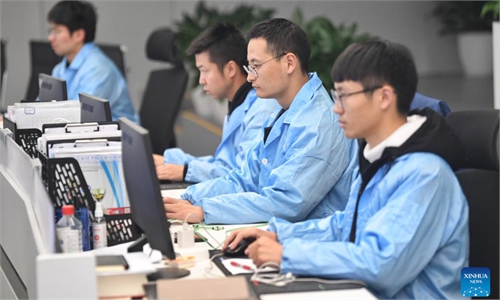
A staff member checks equipment at the National Supercomputing Center in Chengdu, southwest China's Sichuan Province, Feb. 14, 2023.(Photo: Xinhua)
China's Ministry of Science and Technology started the deployment for constructing a supercomputing internet on Monday, aiming to promote the integrated operation of supercomputing and form a technological advanced overall layout by 2025.
Experts said that this move will further elevate the nation's development in related technologies. China already leads the world in supercomputing, supported by the nation's institutional advantages, further boosting its global competitiveness.
The ministry organized a meeting in North China's Tianjin Municipality to launch the deployment for constructing the supercomputing internet while initiating the establishment of a national supercomputing internet consortium, per a statement sent to the Global Times by the ministry.
The supercomputing internet is to operate supercomputing centers through the managing model for the internet to establish an integrated supercomputing network and service platform by connecting various capacities and resources, according to the statement.
The major goal is to closely link the demand and supply sides and lower the threshold of supercomputing applications under a market-oriented operational system, while promoting the high-quality development of related technologies and industries, it said.
The deployment comes amid the nation's higher demand for computing power and a more coordinated operating model for domestic supercomputing centers, read the statement.
It noted that the supercomputing internet will help tackle obstacles such as the uneven distribution of computing power facilities, resulting from the rapid development of new technologies like artificial intelligence (AI) and big data, read the statement.
The supercomputing internet will offer domestic enterprises more easily accessible computing power, which will greatly advance the development of AI, as China already takes the lead in the world in supercomputing with the US, Ma Jihua, a veteran industry observer, told the Global Times on Monday.
Ma added that China has systemic advantages in supercomputing. For instance, the nation's strong computing power will improve the innovation efficiency while lowering operational costs for enterprises. Meanwhile, Chinese enterprises can share resources through computing platforms, further promoting the innovation and development of the entire industry through integrated cooperation.
China and the US both lead the world with comparable supercomputing capability, while the institutional advantages combined with a strong computing power will further boost China's international competitiveness, Ma said.
The Ministry of Science and Technology will build a computing base to promote the integrated operation of supercomputing power through the construction of the supercomputing internet. The supercomputing internet will form an overall layout with advanced technology, innovative model, high-quality service and perfect ecosystem by the end of 2025, per the statement.
China has been stepping up efforts in elevating domestic computing power, in a bid to promote the construction and development of digital China.
China has been building eight national computing hubs under an ambitious plan for constructing the hubs and 10 national-data center clusters, which was approved in 2022. Work started earlier this year on nearly 70 computing centers under the eight hubs, China Media Group reported in March.
China has rolled out a plan for the overall layout of the country's digital development. The plan noted that important progress will be made in the construction of a digital China by 2025, with effective interconnectivity in digital infrastructure, a significantly improved digital economy and major breakthroughs in digital technology innovation, the Xinhua News Agency reported.



